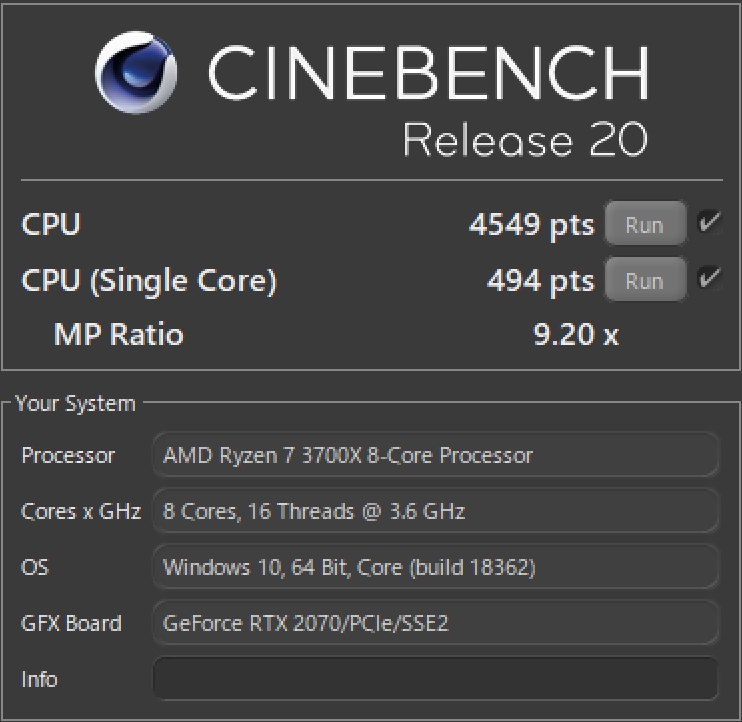
We use Adobe Premiere on a daily basis, currently with a TR 2950X. Meanwhile the 3900X was a little over 60% faster than the 9900K and even offered a 17% performance uplift over the Threadripper 2920X. Here the 3700X was 11% faster than the 9900K and a whopping 52% faster than the 9700K. Then when it comes to decompression work, 3rd-gen Ryzen still enjoys a handy performance advantage. Then we see the 3900X beating the 2920X by an 11% margin and the 9900K by a whopping 45% margin. However, now we see the 3700X brushing aside the 9900K by a 15% margin, basically matching the 10-core 7900X. For example, you can see how the 2700X is 14% slower than the 9900K. Moving on to 7-zip, first we have the compression test where traditionally Ryzen hasn't done that well. Overall a remarkable performance uplift over the 2nd-gen parts. The 3900X also put on a show, though it was only 15% faster than the 3700X and couldn't quite match the 9900K. The 3700X is a staggering 84% faster than the 2700X, allowing it to comfortably beat the 8700K and almost match the Core i9-7900X. The changes AMD made with the Zen 2 architecture have had a profound impact on WinRAR performance, for example. Whereas the Core Complex Die to IO Die link for reading memory is 32 bytes wide, it's only 16 bytes wide for writing, and this significantly reduces write performance which impacts the SiSoftware copy test. As we said earlier all CPUs here are using DDR4-3200 CL14 memory, but interestingly 3rd-gen Ryzen is a little down on 1st and 2nd-gen Ryzen, but there is a good reason for this.ĪMD's made a compromise as client workloads do very little writing, so rather than use this space to improve something that isn't required, they've invested the silicon real estate in more beneficial ways to achieve tangible performance gains. Here we have some memory bandwidth figures and this is sustained read/write performance. The 3700X also did well hitting 500 points and that placed it roughly on par with the 9700K, so this is a massive performance improvement for Ryzen.
3700x cinebench full#
The R9 3900X matched the single core performance of the 9900K and was a full 19% faster than the 2700X. These new 3rd-gen Ryzen parts are already looking like kings of productivity. The new 8-core part matched the 9900K and that meant it was 22% faster than the 2700X and 30% faster than the more expensive 9700K. The Ryzen 7 3700X was equally impressive. Moreover, it decimated the Core i9-9900K by a 45% margin. Scoring an incredible 7086 points makes it 24% faster than the Threadripper 2920X. There's no better place to start than Cinebench R20's multi-threaded benchmark, and boy does the Ryzen 9 3900X looks mighty. Finally, our graphics card of choice was the MSI Trio GeForce RTX 2080 Ti. Do note the Intel CPUs are not TDP restricted as that's not the out of the box experience, so we are showing the absolute best case scenario for out of the box performance. The 8th and 9th-gen Intel Core processors were benchmarked on the Gigabyte Z390 Aorus Ultra, using the same DDR4-3200 CL14 memory, but they were cooled using the Corsair Hydro H115i RGB Platinum 280mm liquid cooler. All have been tested with DDR4-3200 CL14 memory, but there will also be some memory scaling benchmarks included in the review as AMD recommends DDR4-3600 CL16 memory for best results. The MSI X570 Creation motherboard was used for testing the 3900X and 3700X, while the Asus ROG Crosshair VII Hero was used to test the 1st and 2nd-gen Ryzen chips. We'll also provide some 3900X and 3700X performance figures using an all-in-one liquid cooler. This means Intel will have a slight performance advantage, but keep in mind that the cost of the cooler will be factored into our value analysis for each processor. It's an 8-core, 16-thread CPU with a 32MB 元 cache and clocks ranging from 3.6 GHz to 4.4 GHz.īoth 3rd-gen Ryzen CPUs are bundled with the Wraith Prism RGB cooler and we'll be using this for the majority of our testing. Then the Ryzen 7 3700X costs $330 and AMD suggests it's taking on the more expensive 9700K. It costs $500, placing it in direct competition with the Core i9-9900K. It runs at a base frequency of 3.8 GHz with a boost frequency of 4.6 GHz. The Ryzen 9 3900X is a 12-core, 24-thread processor with a massive 64MB 元 cache.

It's interesting AMD didn't choose to dominate the news cycle for a few weeks, so for now we have a very thorough CPU review and tomorrow our full Radeon RX 5700 review (now live). AMD decided to release and lift the review embargo on both Zen 2 and Radeon Navi at the same time, but with much testing to be done we're going to delay our Navi coverage to focus on these Ryzen processors. On hand today we have the Ryzen 9 3900X and Ryzen 7 3700X, with more content to come in the next few days.


It's finally time to review AMD's new 3rd-gen Ryzen processors.


 0 kommentar(er)
0 kommentar(er)
